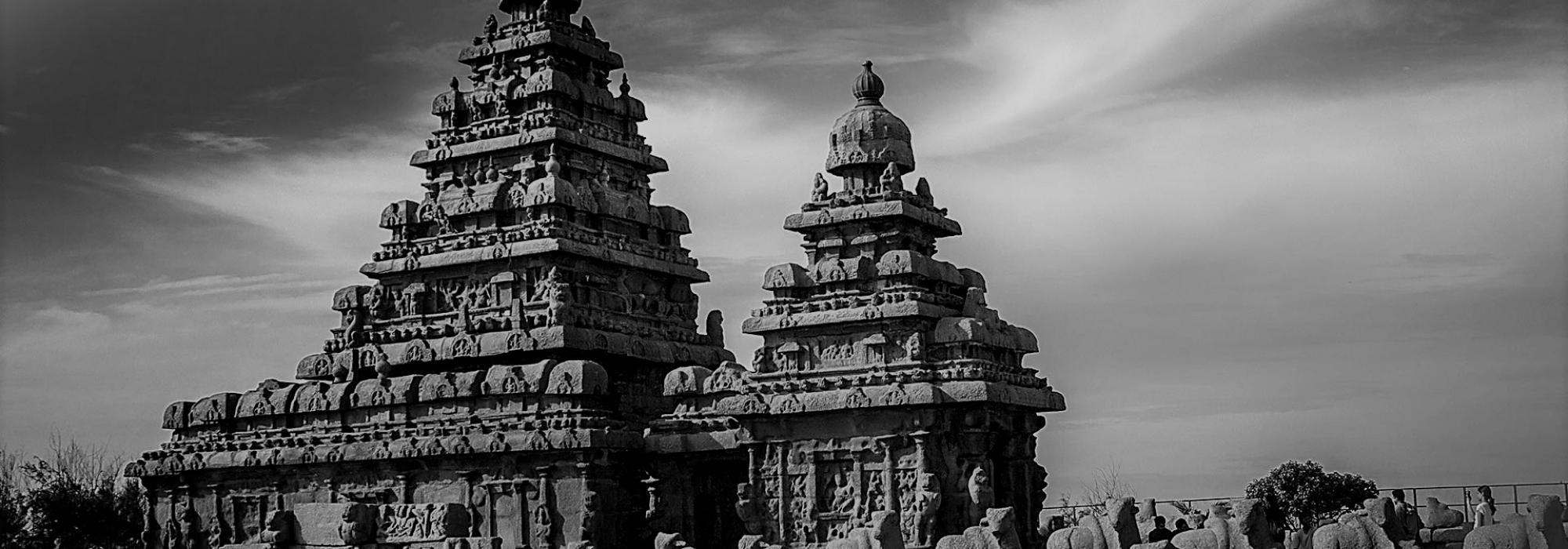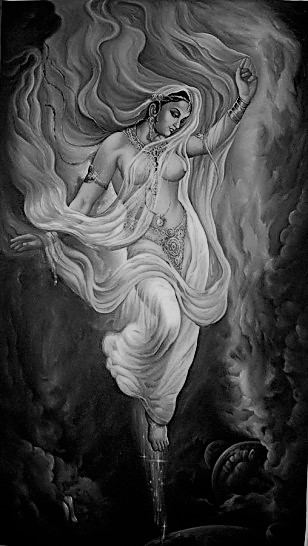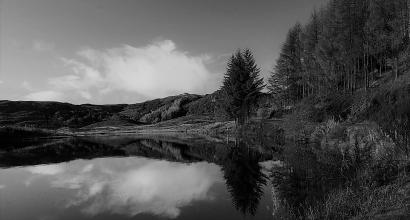The subsequent sarga contains descriptions of a counsel between Taṭātakā, Malayadhvaja’s daughter and her minister, Sumati, followed by a description of the evening –
यः किलानुशरदं विजयार्थी पार्थिवं त्वरयसे गमनाय |
स प्रवर्तयसि मां न कथं त्वं बालिकेयमिति किं विशयानः ||
‘You would, in every autumn, encourage the king, my father, to go on a military expedition. Then why don’t you do the same with me this time? Is it because you fear I am just a young girl?” (8.9)
निष्पतन्नपि रविश्चरमाब्धावुद्दधार किरणानानुयातान् |
ईदृशं व्यसनमस्पृशतः किं लोकबन्धुरिति जीर्यति शब्दः ||
Though the sun kept sinking in the water of the western ocean, he still held up the rays that followed him. Without putting up with such suffering how could he possibly digest the title ‘Friend of the world’ conferred upon him? (8.20)
The idiomatic usage of the verb ‘jīryati’ (to be digested) in the above verse is worth noting.
Then follows the description of a military march and preparations for battle –
विश्लथेषु शरदागमयोगाद्विष्वगैक्षत पयोदकुलेषु |
शातमन्यवशरासनखण्डं हस्तलभ्यमिव हस्तिपकानाम् ||
When, with the onset of autumn, clouds departed, one could see a rainbow stretching all along the horizon and her army’s mahouts felt it was so near they could lay their hands on it (8.40)
How ladies of hamlets greeted Taṭātakā on her way is described in seven verses starting from the forty-third –
पश्य कालि मलयध्वजकन्यां कुब्जिके जनकवन्मुखमस्याः |
ज्यायसी हि दुहितुर्मम मासैः पञ्चशैरियमहो शिशुरेव ||
“Kāli! Look at her. She is Malayadhvaja’s daughter. Kubjika! Doesn’t her face resemble her father’s? She is older to my daughter by five or six months. But, oh! She is just a child”. (8.44)
The ninth Sarga begins with a description of day-break in verses sung by women to awaken Taṭātakā. After this comes a description of Taṭātakā’s victory march.
हंसेषु कञ्चुकिषु षट्चरणेषु कुब्जे-
ष्वादेशहारिषु मरुत्सु च सङ्गतेषु |
उद्घाटयन्त्यधिकृता इव शार्ङ्गपाणे-
रन्तःपुरं घटितमंशुमतो मयूखाः ||
With the coming together of swans standing for chamberlains, bees for dwarfs and winds for messengers, the rays of sun, like a king’s officials, open the hitherto closed doors of Viṣṇu's harem - the lotus, where abides Lakṣmī. (9.5)
भेरीरवश्चलति योजनमेव याव-
त्तावत्ततो दशगुणं चलितः प्रतापः ।
कीर्तिस्ततो दशगुणं व्यचलत्ततोऽपि
चेलुस्ततो दशगुणं विमता विदूरे ॥
The sound of her war-drums had travelled but a few miles when the news of her prowess had travelled a distance ten times farther. Her fame had by now travelled a distance ten times farther than the latter and her enemies had escaped to some remote corner of the world, a distance ten times farther than what her fame had managed to reach. (9.15)
Then comes a beautiful description of the river Gaṅgā in several verses –
पश्याम्ब कीर्तिमिव ते भुवनं पुनाना-
मेनां दयामिव तवास्खलितप्रवाहाम् |
सूक्तिं तवेव च सुधामधुरां गभीरां
भागीरथीं भवजटापटलात्प्रवृत्ताम् ||
Look at her, O mother! She purifies the universe like your fame. Her flow, like that of your kindness, is unfaltering. Like your speech, she is sweet as nectar and full of depth. Look at Bhagīratha’s daughter, slipping from the matted locks of Śiva. (9.32)
तां वाहिनीं सुमहतीमपदिश्य तस्य
गङ्गैव तं गिरिवरं पुनरारुरोह |
प्रस्थानसम्भ्रमवशादनिवेदितं प्रा-
ग्वक्तव्यशेषमिव किञ्चन वक्तुमीशे ||
In the guise of her army it was the river Gaṅgā herself who climbed up the Himalayas. It seemed as if she was returning back to tell Śiva, her lord, something that was left over in her hurry to leave. (9.54)
Following this are a few verses describing how hunters living on the slopes of Himalayas honored her.
अत्रैव नः कुलपतिं धनुषा जघान
मर्त्यः स कश्चिदिति वृद्धजना वदन्ति |
दूरे सुवर्णकदलीवनमेतदम्ब
जीर्णः कपिर्वसति यत्र चिराय कोऽपि ||
“In this very place, a certain human injured the foremost leader of our clan with his bow – so narrate some of our elders. Dear Mother! Yonder is a grove of golden plantains and a very old monkey, they say, has been living there for ages” (9.63)
The above verse is based on two episodes appearing in the Mahābhārata, the first where Arjuna fights with Śiva in the guise of a hunter and the second where Bhīma meets his brother, Hanūmān, residing in a plantain-grove on the slopes of Himalayas.
The Sarga that follows begins with the description of a battle between Taṭātakā and the guardian-deities of the directions starting with Indra –
भूसुरस्वमुपभुज्य केवलं ते हि पुष्टवपुषो दिवौकसः |
तन्मुखे शिथिलतां जगाहिरे सेतवः पयसि सैकता इव ||
Like a sandy bridge built in water, the celestial horde that had only managed to grow plump with the offerings of Brahmin priests just disappeared in front of her. (10.12)
Some humorous verses on her encounter with the fire-god and wind-god are given below
पाणिपीडनमहोत्सवे तव प्रार्थये सपदि साक्षितामिति |
ईरिते हुतवहेन सस्मिता तं विसृज्य चलति स्म सा पुरः ||
“When you are married off, please do call me to bear witness” – thus did the fire-god tell her and she bid him farewell with a smile. (10.38)
तान्प्रदर्श्य पवनान्पृथक्पृथाग्व्याजहार सचिवो नृपातमजाम् |
एष जानपदा एव देवि नो मारुतो मलयशैलमाश्रितः ||
Pointing out the various winds individually, the minister spoke thus to the king’s daughter – “This chap here is known to us. He is the breeze from the Malaya Mountain”. (10.55)
Then comes a description of her fight with Śiva’s hordes, headed by Nandi.
The Sarga that follows describes how Taṭātakā and Śiva, the bride and groom, decked up for their marriage –
विभूषितस्यास्य पुरः पुरन्दरो विशालमेकं मुकुरं समाददे |
न तत्समश्चेति गिरं पुरातनीमपाकारिष्यन्निव बिम्बलम्भनात् ||
When the groom was made up, Indra held a large mirror in front of him as if to prove false the scriptures which declare that He has no mirror-image. (11.31)
हरस्य शृङ्गाररसाधिदेवतामवेक्ष्य तां मन्थरमायतीं पुरः |
अलज्जत श्रीर्जगदादिसुन्दरी ललज्जिरे लज्जितुमप्सरोगणः ||
Beholding Taṭātakā, the presiding deity of Śiva’s love, approach her in a gait that was measured and slow, Lakṣmī, universe’s first sample of feminine beauty, felt ashamed while the Apsarases, celestial maidens, felt ashamed to even feel ashamed. (11.76)
The twelfth Sarga describes the marriage between Śiva and Taṭātakā –
दातुर्ग्रहीतुश्च किमस्ति गोत्रं को वा पिता कश्च पितामहो वा |
अतोऽद्भुतस्तुभ्यमिमां ददामीत्यासीदियानेव तु दानमन्त्रः ||
Who knew the lineage, father or grandfather of either the giver, Viṣṇu or the acceptor, Śiva? Therefore, when Taṭātakā was given away in marriage, the accompanying holy chant was strangely brief and just this – “I am giving her to you” and nothing else. (12.8)
अश्मानमारोपयितुं पादाब्जमालम्बमाने दयिते मृगाक्ष्याः |
पादग्रहः प्राथमिकोऽयमस्याःप्रचीयतामित्यवदन्मुकुन्दः ||
When the groom caught hold of Taṭātakā’s lotus-foot in order to place it on the stone-slab, Viṣṇu blessed him thus – “May this first effort at holding her foot bring about more such opportunities in the days to come”. (12.13)
The thirteenth Sarga starts with a description of Sundareśvara’s rule. Then comes the story of Ugra, Sundareśvara’s successor, under whose rule there was a famine in the Pāṇḍya kingdom. A war ensued between the king and Indra, the rain-god, in which the latter was defeated.
The fourteenth Sarga describes king Urga as having made a trip to Mount Meru on the orders of Śiva. A catchy description of the mountain follows –
सर्वरत्नाकरं हैमं संरक्षितुमहर्निशम् |
यामिकाविव चन्द्रार्कौ यं न जातु विमुञ्चतः ||
He is the abode of all gems and is himself golden in form. Therefore the sun and the moon, like two patrolling guards, forsake him neither by day nor by night. (14.11)










































